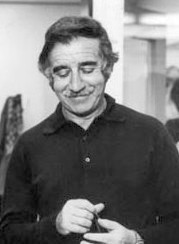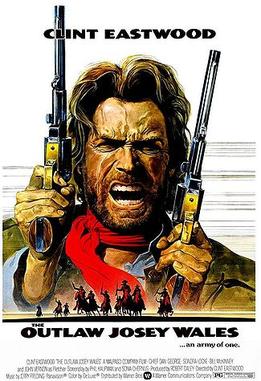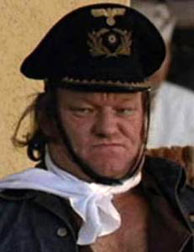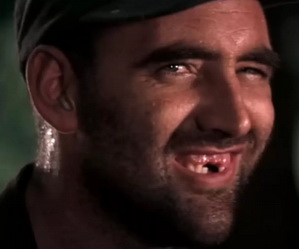Related Research Articles

Donald Siegel was an American film and television director and producer.

Clinton Eastwood Jr. is an American actor and film director. After achieving success in the Western TV series Rawhide, Eastwood rose to international fame with his role as the "Man with No Name" in Sergio Leone's Dollars Trilogy of spaghetti Westerns during the mid-1960s and as antihero cop Harry Callahan in the five Dirty Harry films throughout the 1970s and 1980s. These roles, among others, have made Eastwood an enduring cultural icon of masculinity. Elected in 1986, Eastwood served for two years as the mayor of Carmel-by-the-Sea, California.

Benjamin Sherman “Scatman” Crothers was an American actor and musician. He is known for playing Louie the Garbage Man on the TV show Chico and the Man, and Dick Hallorann in Stanley Kubrick's The Shining (1980). He was also a prolific voice-over actor who provided the voices of Meadowlark Lemon in the Harlem Globetrotters animated TV series, Jazz the Autobot in The Transformers and The Transformers: The Movie (1986), the title character in Hong Kong Phooey, and Scat Cat in the animated film The Aristocats (1970).

The Outlaw Josey Wales is a 1976 American revisionist Western film set during and after the American Civil War. It was directed by and starred Clint Eastwood, with Chief Dan George, Sondra Locke, Bill McKinney and John Vernon. The film tells the story of Josey Wales, a Missouri farmer whose family is murdered by Union militia during the Civil War. Driven to revenge, Wales joins a Confederate guerrilla band and makes a name for himself as a feared gunfighter. After the war, all the fighters in Wales' group except for him surrender to Union soldiers, but the Confederates end up being massacred. Wales becomes an outlaw and is pursued by bounty hunters and Union soldiers as he tries to make a new life for himself.

Deliverance is a 1972 American thriller film produced and directed by John Boorman, and starring Jon Voight, Burt Reynolds, Ned Beatty, and Ronny Cox, with the latter two making their feature film debuts. The screenplay was adapted by James Dickey from his 1970 novel of the same name. The film was a critical and box office success, earning three Academy Award nominations and five Golden Globe Award nominations.

William Emmett Smith was an American actor. In a Hollywood career spanning more than 79 years, he appeared in almost three hundred feature films and television productions in a wide variety of character roles, often villainous or brutal, accumulating over 980 total credits, with his best known role being the menacing Anthony Falconetti in the 1970s television mini-series Rich Man, Poor Man. Smith is also known for films like Any Which Way You Can (1980), Conan the Barbarian (1982), Rumble Fish (1983), and Red Dawn (1984), as well as lead roles in several exploitation films during the 1970s and 1990s.

The Getaway is a 1972 American action thriller film based on the 1958 novel by Jim Thompson. The film was directed by Sam Peckinpah, written by Walter Hill, and stars Steve McQueen, Ali MacGraw, Ben Johnson, Al Lettieri and Sally Struthers. The plot follows imprisoned mastermind robber Carter "Doc" McCoy, whose wife Carol conspires for his release on the condition they rob a bank in Texas. A double-cross follows the crime, and the McCoys are forced to flee for Mexico with the police and criminals in hot pursuit.
Joe Don Baker is an American character actor and a life member of the Actors Studio. He established himself as an action star with supporting roles as a mysterious cowboy drifter in Guns of the Magnificent Seven (1969), and as a deputy sheriff in the western Wild Rovers (1971), before receiving fame for his roles as a mafia hitman in Charley Varrick (1973), real-life Tennessee Sheriff Buford Pusser in the action film Walking Tall (1973), a brute force detective in Mitchell (1975), deputy sheriff Thomas Jefferson Geronimo III in Final Justice (1985), and police chief Jerry Karlin in the action-comedy Fletch (1985). He is also known for his appearances as both a villain and an ally in three James Bond films: as Brad Whitaker in The Living Daylights (1987) and as CIA Agent Jack Wade in GoldenEye (1995) and Tomorrow Never Dies (1997).

Asa Earl Carter was a 1950s segregationist political activist, Ku Klux Klan organizer, and later Western novelist. He co-wrote George Wallace's well-known pro-segregation line of 1963, "Segregation now, segregation tomorrow, segregation forever", and ran in the Democratic primary for governor of Alabama on a white supremacist ticket. Years later, under the pseudonym of supposedly Cherokee writer Forrest Carter, he wrote The Rebel Outlaw: Josey Wales (1972), a Western novel that led to a 1976 film featuring Clint Eastwood that was adopted into the National Film Registry, and The Education of Little Tree (1976), a best-selling, award-winning book which was marketed as a memoir but which turned out to be fiction.

John Keith Vernon was a Canadian actor. He made a career in Hollywood after achieving initial television stardom in Canada. He was best known for playing Dean Wormer in Animal House, the Mayor in Dirty Harry and Fletcher in The Outlaw Josey Wales.

John William Saunders III, better known by the stage name John Quade, was an American character actor who starred in film and in television. He was best known for his role as Cholla, the leader of the motorcycle gang the Black Widows in the Clint Eastwood films Every Which Way but Loose (1978) and its sequel Any Which Way You Can (1980).

The Shootist is a 1976 American Western film directed by Don Siegel and based on Glendon Swarthout's 1975 novel of the same name, and written by Miles Hood Swarthout and Scott Hale. The film stars John Wayne in his last film appearance before his death in 1979, Lauren Bacall, Ron Howard, James Stewart, Richard Boone, John Carradine, Scatman Crothers, Richard Lenz, Harry Morgan, Sheree North and Hugh O'Brian.

Richard Warren Schickel was an American film historian, journalist, author, documentarian, and film and literary critic. He was a film critic for Time from 1965–2010, and also wrote for Life and the Los Angeles Times Book Review. His last writings about film were for Truthdig.

Mary Murphy was an American film and television actress of the 1950s, 1960s and 1970s.
Doug McGrath is a Canadian actor whose most notable role was that of "Peter" in the acclaimed Canadian film Goin' Down the Road (1970) and its sequel Down the Road Again (2011). He also played in acclaimed Canadian films Wedding in White (1972), The Hard Part Begins (1973), the original Black Christmas (1974), Russian Roulette (1975) and Coming Out Alive (1980). He had a supporting role as a gym teacher in the cult comedy Porky's (1981), and also played roles in The Escape Artist (1982), Twilight Zone: The Movie (1983), the Australian comedy The Return of Captain Invincible (1983), Always (1989) and Ghosts of Mars (2001).
Bruce Mohr Powell Surtees was an American cinematographer, the son of Maydell and cinematographer Robert L. Surtees. He is best known for his extensive work on Clint Eastwood's films. His cinematography was compared to that of the Dollars trilogy of Sergio Leone.

Tiffany Bolling is a retired American actress, model and singer, best known for her appearances in cult movies.
William O'Connell was an American film and television actor.

Steve McQueen was an American actor who had an extensive career in film and television. Popularly known as the "King of Cool", McQueen's screen persona was that of portraying cool, reticent antihero roles, which appealed strongly to the masses. This led him to cement his status as one of the most famous celebrities in Hollywood during the counterculture of the 1960s.

Herbert Lee "Cowboy" Coward was an American actor. He played one of two sadistic mountain men in John Boorman's 1972 film Deliverance, and several of his lines became infamous in pop culture.
References
- ↑ Rosebrook, Jeb; Rosebrook, Stuart (2019). "Act One". Junior Bonner: The Making of a Classic with Steve McQueen and Sam Peckinpah in the Summer of 1971. Albany, Georgia: BearManor Media. ISBN 978-1-62933-289-5.
- ↑ Slotnik, Daniel E. (December 5, 2011). "Bill Kinney, Actor in 'Deliverance,' Dies at 80". The New York Times . Retrieved October 4, 2015.
- 1 2 3 "Bill McKinney Filmography". Movies & TV Dept. The New York Times . 2015. Archived from the original on April 6, 2015. Retrieved March 6, 2015.
- 1 2 3 Cammila Collar (2015). "Bill McKinney". Movies & TV Dept. The New York Times . Archived from the original on April 6, 2015. Retrieved March 6, 2015.
- 1 2 Wiegand, Chris (December 8, 2011). "Bill McKinney obituary". The Guardian . Retrieved May 31, 2014.
- ↑ "Sherwood Horror Adds a Legendary Character Actor". Dread Central . February 2, 2010. Archived from the original on December 2, 2013. Retrieved February 3, 2010.
- ↑ "Sherwood Horror Finds Deliverance Baddie". Shock Till You Drop. February 2, 2010. Archived from the original on August 14, 2012. Retrieved February 3, 2010.
- ↑ O'Connell, Michael (December 2, 2011). "Bill McKinney, 'Deliverance' Mountain Man, Dies at 80". The Hollywood Reporter . Retrieved December 2, 2011.
- ↑ Grossberg, Josh (December 2, 2011). "Bill McKinney, Deliverance's Mountain Man and Eastwood Sidekick, Dead at 80". E! News UK. Retrieved December 2, 2011.
- ↑ "Bill McKinney". Facebook. December 1, 2011. Retrieved December 1, 2011.